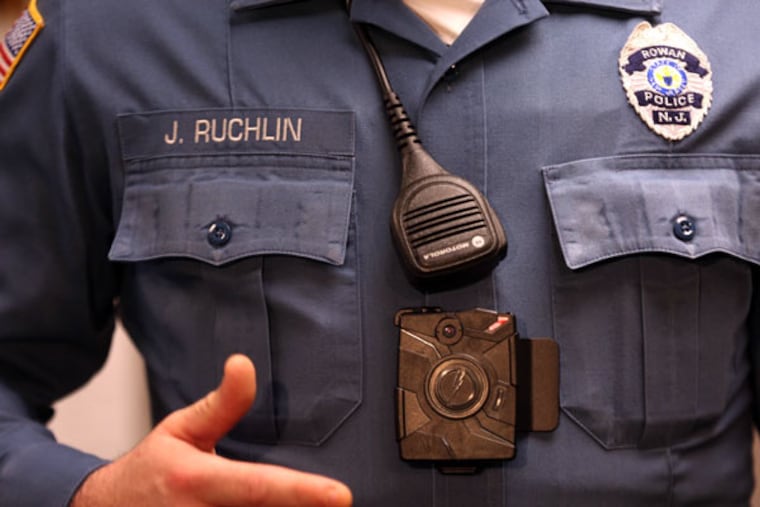Rowan campus police begin wearing body cameras
Rowan University announced Tuesday that its 34 public safety officers have begun using body cameras. The devices will be activated when officers respond to incidents, including theft, assault, and illegal alcohol or drug use, which are the most common offenses on campus.

Rowan University announced Tuesday that its 34 public safety officers have begun using body cameras.
The devices will be activated when officers respond to incidents, including theft, assault, and illegal alcohol or drug use, which are the most common offenses on campus.
Rowan says it is the first university in New Jersey to have officers use the cameras. It paid $95,000 for the cameras and for electronic space to store the footage. Rowan pulled money from its general fund, which includes tuition dollars, to cover the costs, university officials said.
The goal at Rowan, officials say, is to keep both officers and suspects accountable.
"The object of these cameras is transparency," Rowan Police Lt. Craig Shute said. "To show our community what we're doing out here."
The AXON cameras, which Rowan purchased from TASER International, will be attached to an officer's uniform. The officer must press the center of the camera twice to begin recording. The device then emits a loud beep.
Before entering private areas such as a dorm room, Rowan officials said, an officer must tell an individual he or she is wearing a camera.
The university will download and store the footage on a website called evidence.com. A recording will be deleted after 90 days if officers did not make an arrest. If they did, it can be used as evidence in court.
Much of the cost of body cameras comes from storing the footage, which "accumulates really fast," said Reed Layton, Rowan's senior director of public safety. The cameras themselves are only about $300 each, he said.
Under Rowan's contract with TASER International, any body cameras that are damaged during the next five years will be replaced at no cost, Layton said.
Some campuses in New Jersey have officers use devices other than body cameras to record encounters. Rutgers, for example, has cameras in patrol vehicles, as well as body microphones that officers wear to record audio when they respond to an incident.
Gov. Christie signed a bill last year that requires police vehicles - or officers - to be fitted with video-recording systems. Those include body cameras or dash-cam videos.
While the bill applies only to municipal, and not college or university, police departments, Rowan officials say it helped spur them to purchase the body cameras.
"It's not a reaction to anything or a crime or a spike in crime," said Jose Cardona, vice president for university relations. "We're just staying ahead of the curve."
The university has relatively low crime rates, Cardona said. In 2013, for example, there was just one robbery reported on the main Glassboro campus.
Rowan officials met with student groups to discuss the cameras before officers began using them Monday, both at the Glassboro campus and the university's School of Osteopathic Medicine in Stratford.
Anissa Roper, 21, a junior on the Glassboro campus, said she hoped officers would use the cameras to record an entire incident - not just the parts they want the public to see.
"I think it's a pretty good idea," she said. "It just kind of depends on how they're using it."